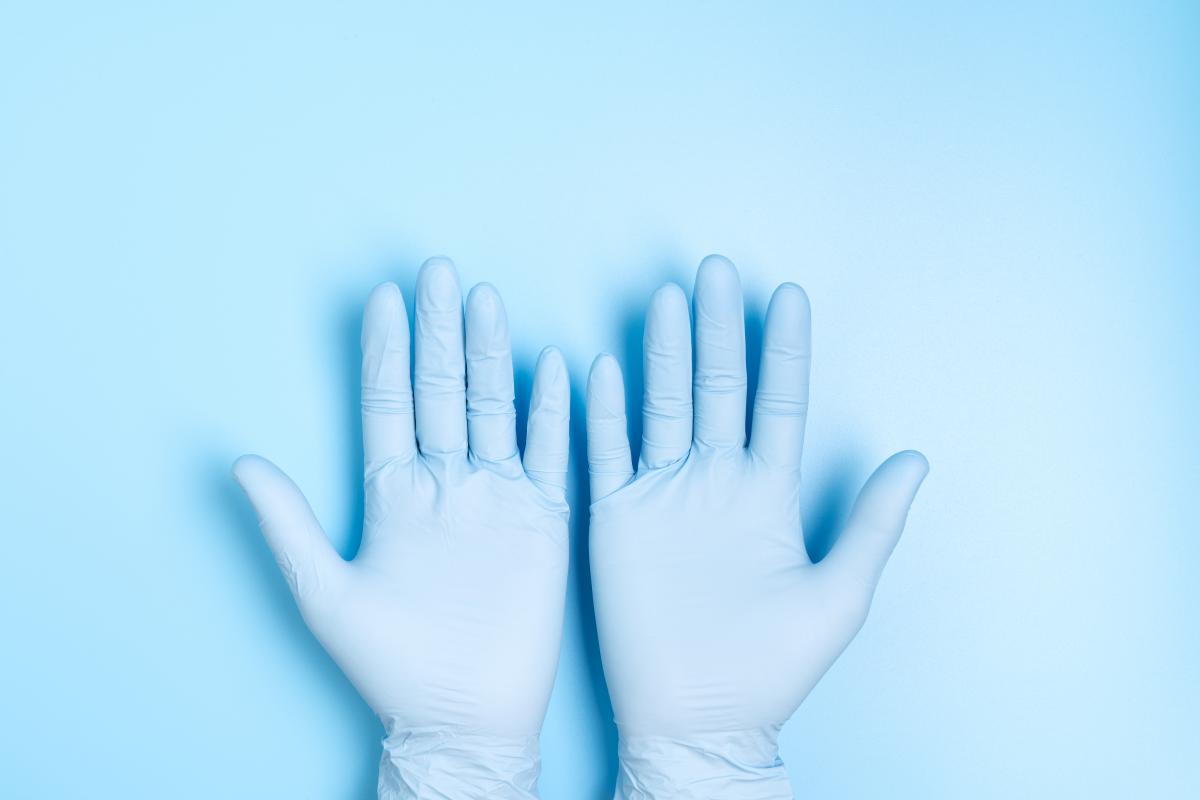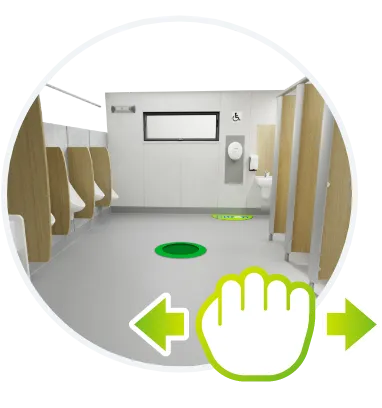The need for Personal Protective Equipment (PPE) within your business is paramount to ensure the safety of employees and visitors. Hygiene and safety expectations have been elevated following the global covid-19 pandemic but by ensuring your business is fully equipped with quality health and safety supplies you can guarantee customers, employees and visitors feel confident and safe without the workplace. Continue reading to learn more about PPE is and why it is so important.
Table of Contents
What is PPE?
Personal Protective Equipment (PPE) refers to equipment that works as a barrier to protect the users against health or safety risks within the workplace. PPE equipment is designed to protect you from harmful substances such as chemicals or infectious agents. It can be found in a variety of forms including items such as gloves, safety helmets, high visibility clothing, safety footwear such as steel cap boots, or the more commonly known in recent times, respiratory protective equipment.
Respiratory protective equipment is any protective clothing or equipment designed to protect the wearer and act as a barrier between an individual’s mouth, nose or eyes. The protective equipment will prevent direct contact bacterial infections and viruses such as Covid-19 or toxic substances that could be present. Due to the pandemic and current restrictions, it is now a requirement to wear face coverings and other PPE in a number of settings including on public transport, in supermarkets and in places of worship. The full list of locations where face coverings are required can be found on the UK Government’s website .
All PPE that is worn within the medical setting must follow the FDA’s regulations and must meet applicable voluntary consensus standards to ensure protection.
Why is PPE Important?
The need for PPE within the workplace facilities is more important than ever to ensure the safety of employees, visitors and patients. PPE plays a vital role in contributing to a safe workplace by ensuring staff are protected from bacteria, poor levels of hygiene, chemical substances or hazards that could lead to injury.
Without effective PPE safety equipment provided to workers in certain industries such as manufacturing, or oil industries, there is a significantly higher risk of injury from hazardous working conditions that could not only put employees at harm but could be a detriment to your business. Lack of PPE equipment can also increase the risks of infection across any facility causing harmful bacterial and viral infections such as Covid-19 to spread putting everyone at risk of illness.
Why is PPE Effective at Preventing Infection?
Respiratory protective equipment such as face coverings and safety visors are used to protect the wearer by acting as a barrier between the airborne respiratory droplets containing the virus and the individual’s mouth, nose and eyes effectively reducing the risk of transmission.
The FDA explains that if PPE is used properly and in conjunction with other infection control best-practices such as regularly hand washing, the use of alcohol-based hand sanitisers, wiping surfaces down regularly with effective surface wipes or cleaning products and using your elbow crease when coughing or sneezing, these can all be effective measures to minimise the spread of infection from one person to another.
To encourage best practices, why not download our free hygiene guidance posters to display around your facility?
Who Should Be Using PPE?
Medical PPE is most commonly used in health care settings such as GP practices, hospitals, clinical labs and dental practices. Other industries that should be supplied with effective PPE equipment include industries such as construction, Oil & Gas, Manufacturing, Pharmaceutical Industry and any business handling or preparing food or beverages. PPE in these sectors will lessen the likelihood of injury, illness and legal issues that could arise from lack of safety equipment.
With the recent global pandemic, we have witnessed a dramatic spike in the demand for high quantities of PPE in different settings such as schools, salons and retail outlets to protect staff and visitors against the highly contagious virus Covid-19. With more industries relying on PPE supplies to keep staff safe it is important businesses are fully equipped with the correct products.
What Are the Different Types of PPE?
There are various types of PPE equipment available to protect areas of the body from harm or injury. For an extensive list on the different types of PPE, check out the HSE guidelines. Some forms of PPE can include:
• Eyes: Safety Goggles, Face Shields & Visors.
• Head & neck: Safety Helmets and hair nets
• Ears: Earmuffs or ear plugs
• Hand & arms: Disposable Nitrile gloves, gloves with a cuff
• Feet and legs: Safety boots/shoes
• Lungs: Respiratory protective equipment such as surgical masks or disposable face masks.
• Whole Body: disposable overalls, chemical suits or boiler suits.
Is PPE Considered Clinical Waste?
Clinical waste is defined as any waste which contains infectious substance and could lead to an infection with any person coming into contact with it. This could include waste such as drugs, pharmaceutical products like dressings, syringes, needles or waste arising from any medical practice, nursing, dental, veterinary or similar practices that could carry harmful diseases. All clinical waste should be disposed of in orange bags to be disposed of by incineration. PPE that has come into contact with contaminated substances should be disposed of as clinical waste in the orange bins using the colour-code system. Find out more information about what clinical waste is and how it should be disposed of.
In situations where used PPE that does not present an infection risk and there are no medicines or chemicals present, these are classed as offensive waste rather than clinical. Offensive waste should be disposed of in black & yellow ‘tiger’ bags. Our blog features guidance on correct waste segregation and management.
Take a look around…
Use our virtual washroom to see how our solutions will elevate your washroom experience
Duty of Care & the Correct Disposal of PPE
It’s important to remove and dispose of PPE properly to minimise the risk of injury or the spread of infection between one person to another. Once PPE has been used it should be disposed of after a single use. Any business or setting that uses PPE has a duty of care to staff, visitors and customers to dispose of waste correctly. Disposing of duty of care to disposal of PPE correctly. Placing PPE in ‘normal’ waste bins can lead to cleaning teams having to pick up unsealed waste that could potentially be carrying harmful germs and bacteria, while it can also present a negative impression.
How to Dispose of PPE waste?
PPE waste that has not been in contact with an infectious source but has been contaminated can be disposed of as offensive waste and is suitable for placing in yellow bin bags. However, if PPE waste has been exposed to infectious bacteria but clinical waste services are not available, it must be disposed of using the following guidelines:
• PPE must be put in a plastic waste bag and tied when full.
• This plastic bag should then be placed in a second bin bag for extra protection and tied again to secure.
• It should then be placed in a safe, secure isolated area for 72 hours after which it can be disposed of in the general waste bin.
When dealing with PPE waste used for social distancing or against viral infections, you should always refer to the latest Government guidelines for advice before disposing of the waste or talk to your waste management company.
Download our helpful display poster to remove PPE correctly.
Citron Hygiene’s PPE Waste Disposal Services
If your business is looking to dispose of PPE waste safely, Citron Hygiene can support your facility with over 45 years’ experience in waste management. We can ensure you stay compliant and our hygiene experts with collect your waste on a pre-determined schedule. Find out more about our PPE waste management services.
As lateral flow testing takes place in schools, care homes and other environments, as a licensed carrier, we can support your establishment to safely dispose of PPE and LFDs. Get in touch with our friendly team using the form at the bottom of this page or call 08000 66 55 52 to enquire.

